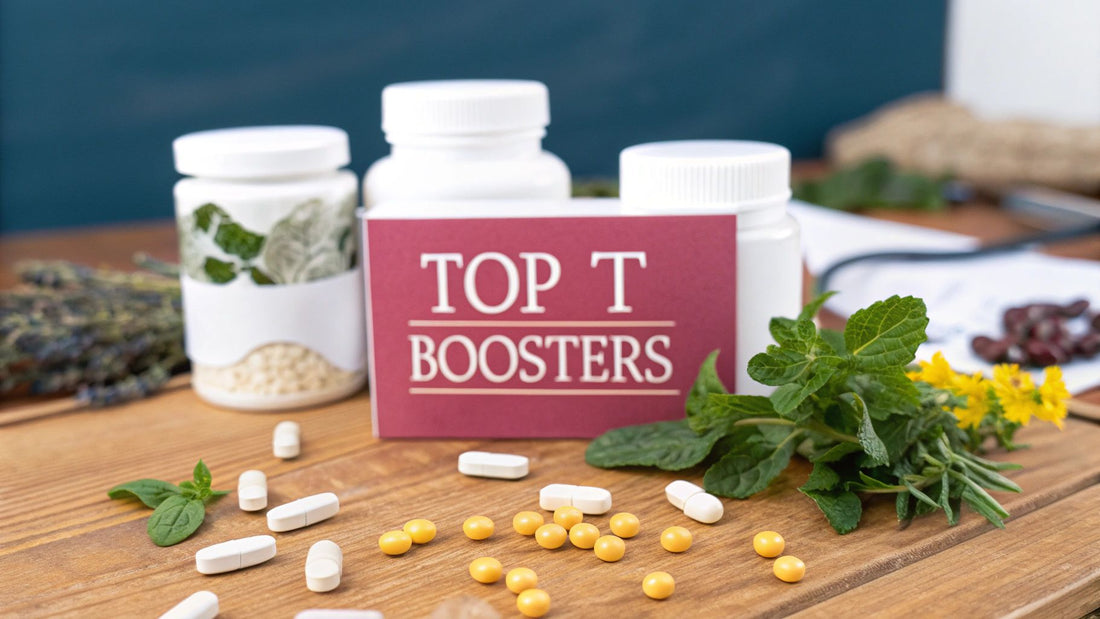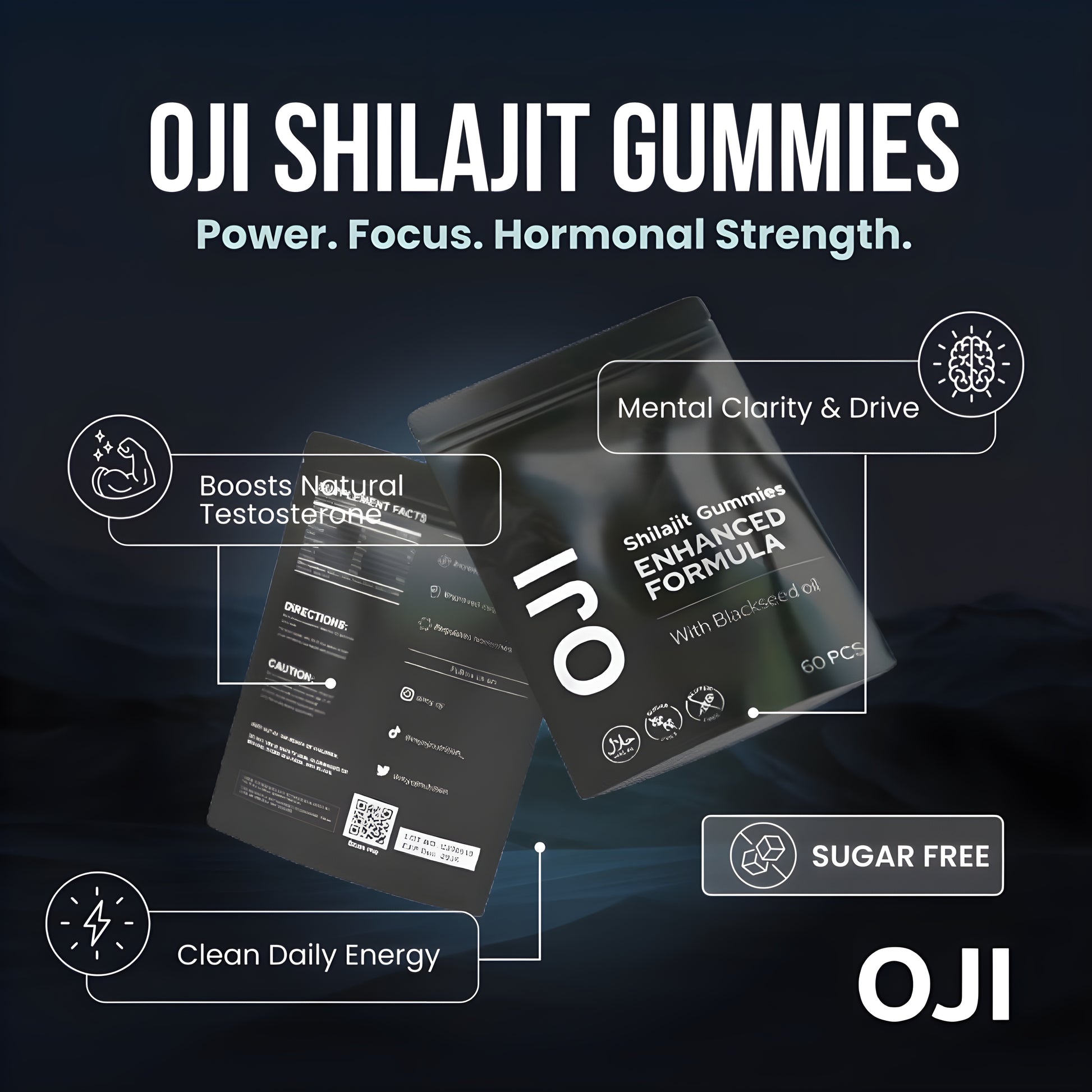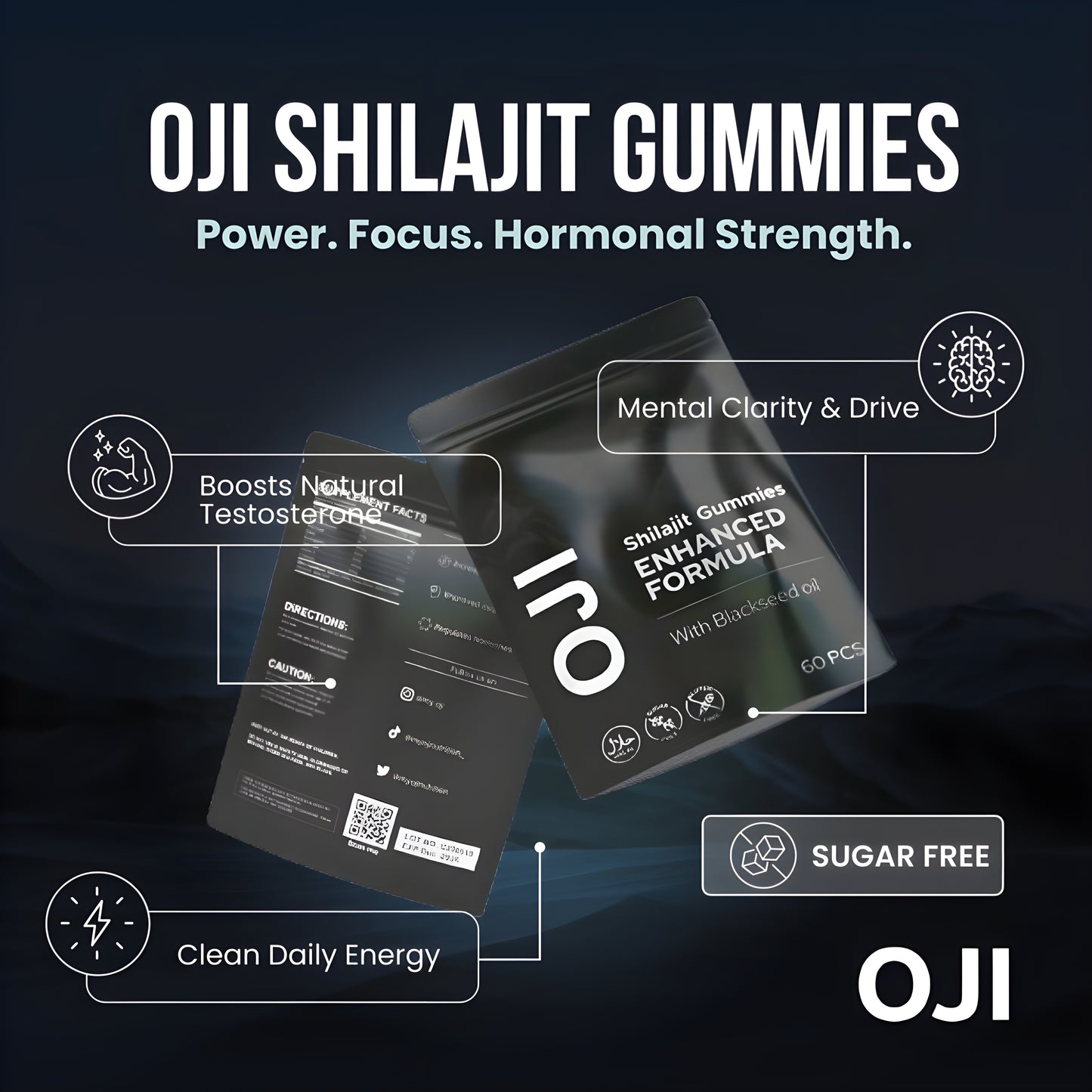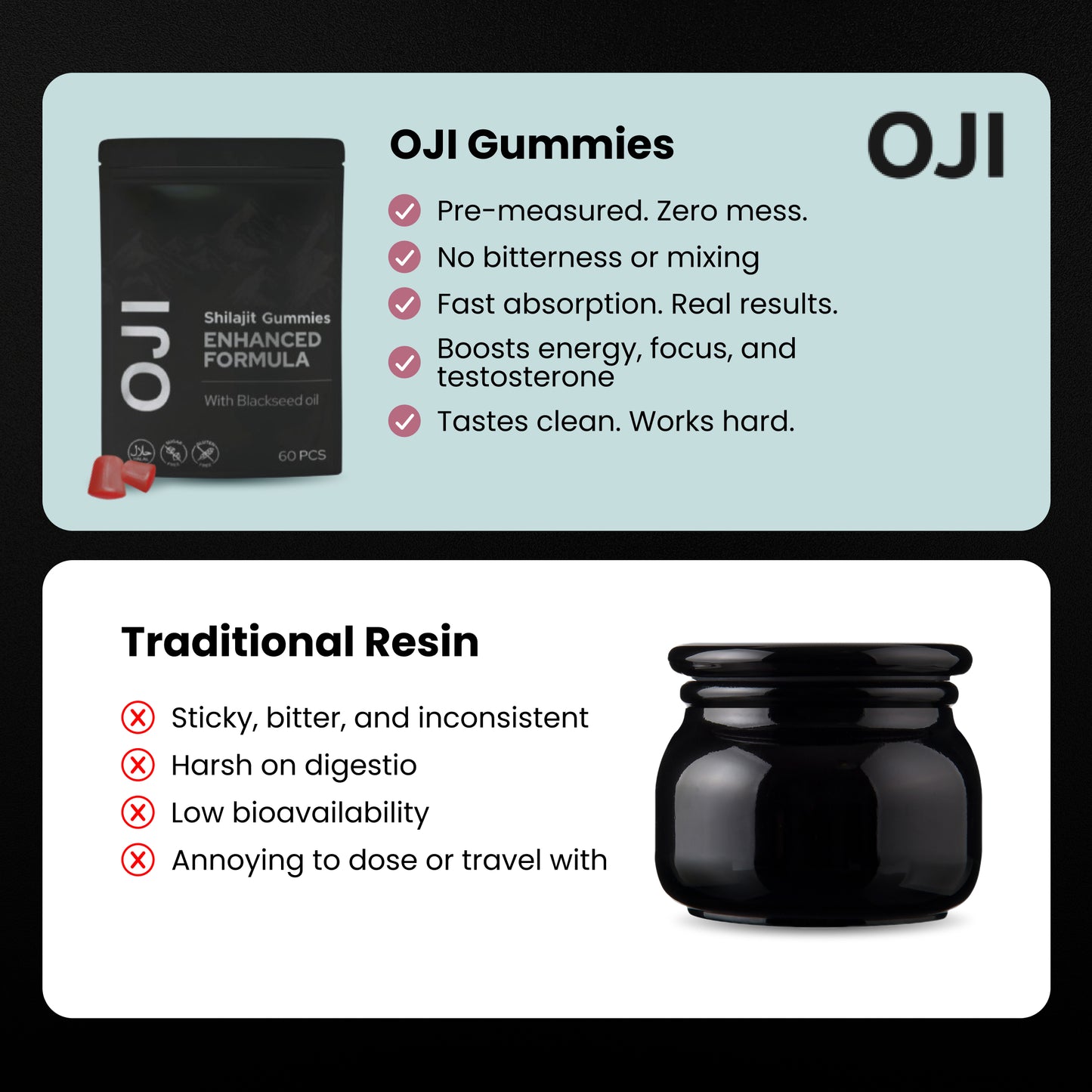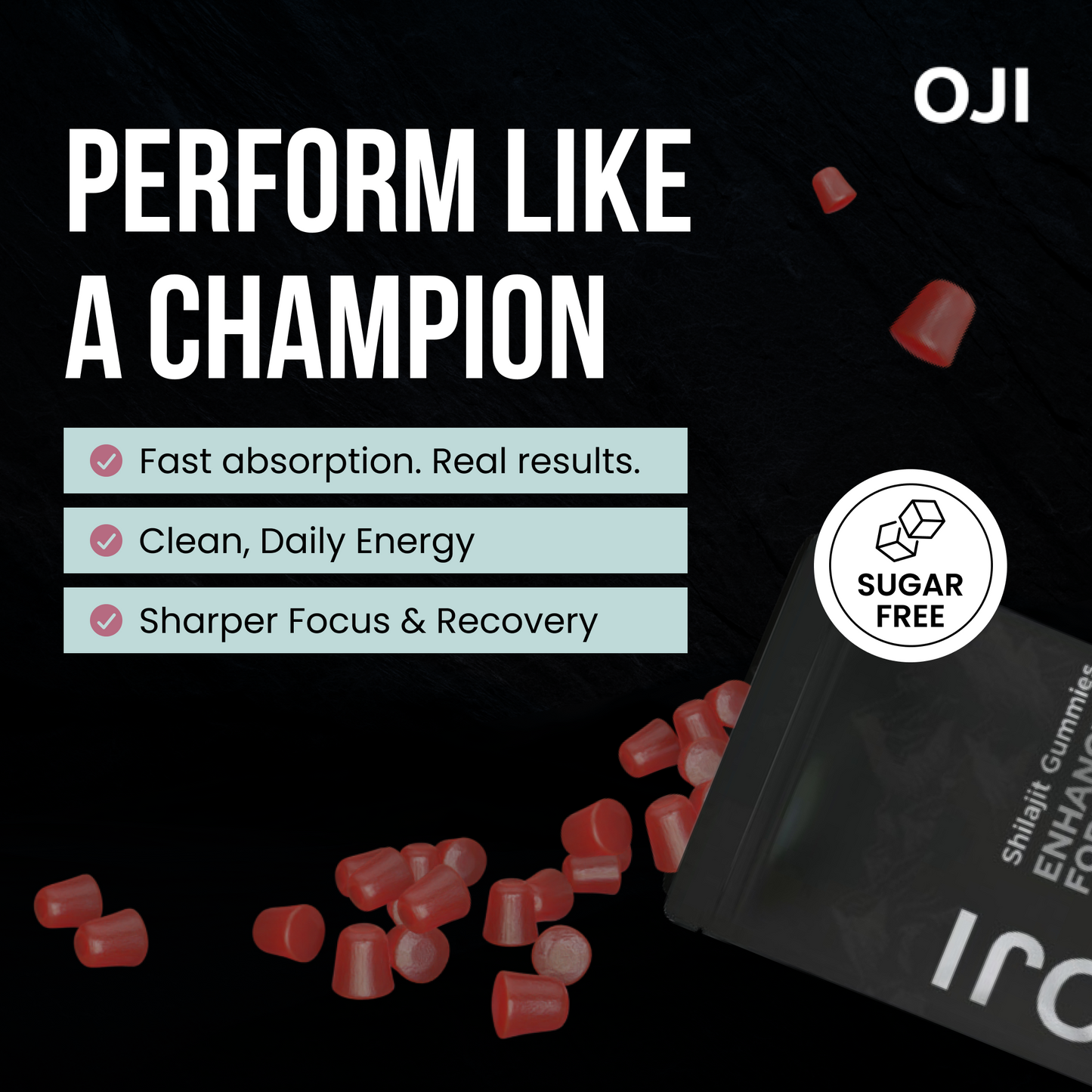Navigating the World of Natural Testosterone Support
Testosterone is a cornerstone of male health, influencing everything from muscle mass and energy levels to mood and cognitive function. As men age or face modern lifestyle pressures, natural testosterone levels can decline, leading many to seek effective support. However, the market for testosterone boosters is saturated with bold claims and complex formulas, making it difficult to separate science from marketing hype. This guide cuts through the noise.
We will provide an in-depth, evidence-based analysis of the best testosterone boosting supplements, focusing on single-ingredient compounds proven to work. You will learn about the specific mechanisms, clinical evidence, optimal dosages, and who can benefit most from ingredients like D-Aspartic Acid, Ashwagandha, and Tongkat Ali. Our goal is to empower you with the knowledge to make an informed decision, whether you're an athlete optimising performance or a man seeking to restore vitality.
This comprehensive roundup is designed to move beyond generic advice. We will dive into the specific, actionable details that can genuinely make a difference in your hormonal health strategy. By understanding how these key ingredients function, you can confidently select the right supplement to support your unique wellness and performance goals.
1. D-Aspartic Acid (DAA)
D-Aspartic Acid, often abbreviated as DAA, is a naturally occurring amino acid that plays a pivotal role in the endocrine system. Unlike its counterpart L-Aspartic Acid, which helps build proteins, DAA is concentrated in neuroendocrine tissues like the pituitary gland and testes. It functions as a key signalling molecule, making it a cornerstone of many of the best testosterone boosting supplements available today.
Its primary mechanism involves stimulating the central brain region to release hormones. Specifically, DAA encourages the pituitary gland to increase its output of luteinizing hormone (LH). This hormone then travels through the bloodstream to the Leydig cells in the testes, signalling them to ramp up testosterone production. This direct, two-step process makes DAA a popular choice for those seeking a targeted approach to hormonal optimisation.
How to Use D-Aspartic Acid Effectively
The appeal of DAA lies in its relatively rapid action and significant impact, particularly for men with pre-existing low testosterone levels. Research, notably from the University of Naples, has shown it can elevate testosterone by as much as 30–60% in just 12 days.
For example, bodybuilders often incorporate a 3-gram daily dose during a cutting phase to help preserve muscle mass when in a calorie deficit. Similarly, men over 40 frequently use DAA as part of a broader hormone support protocol to counteract age-related declines in vitality and energy.
To help you visualise the core data on DAA, here is a quick summary of its key usage metrics.
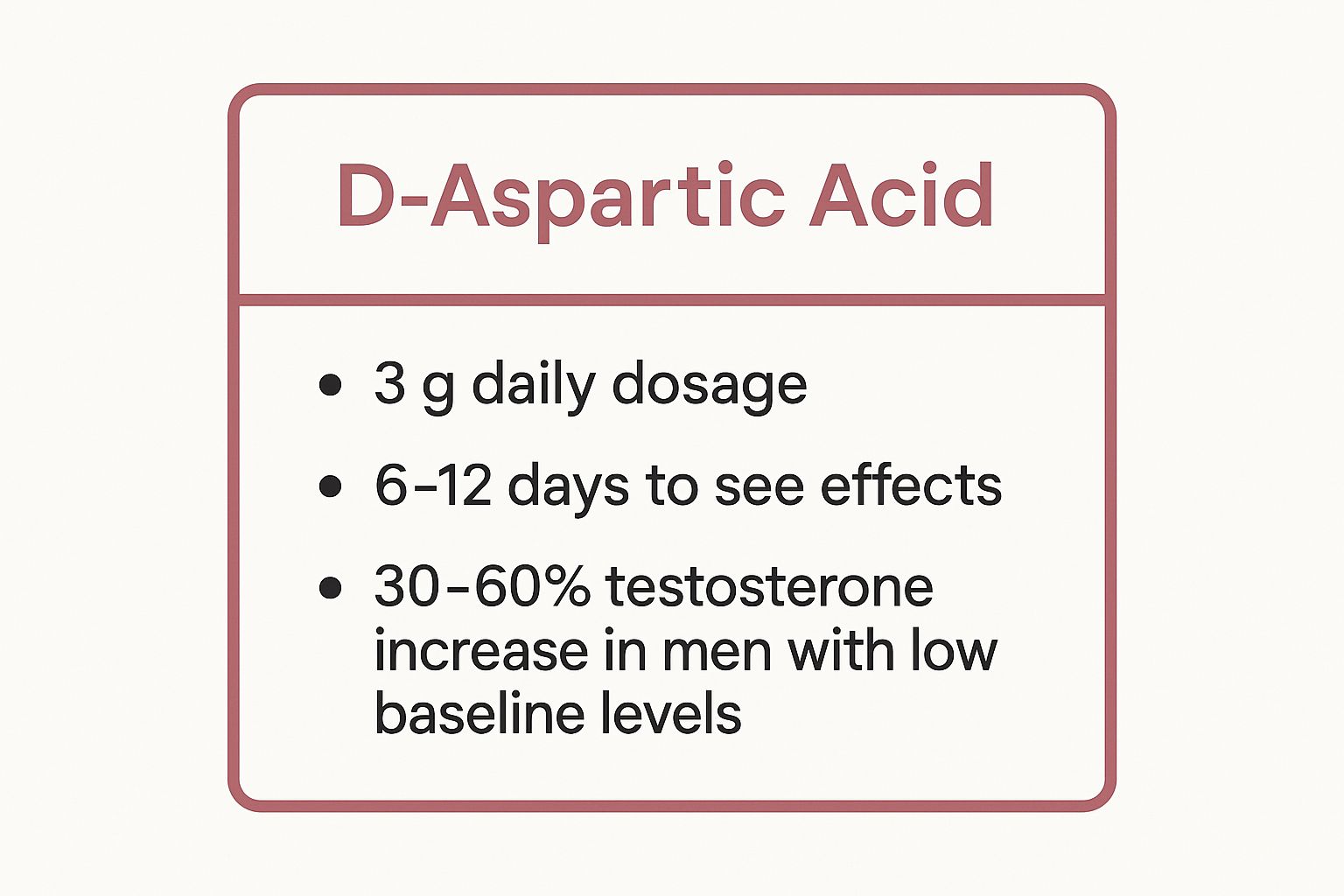
These figures highlight why DAA is valued for its potential to deliver noticeable results within a short timeframe.
Actionable Tips for Supplementation
To maximise the benefits of D-Aspartic Acid, consider these practical tips:
- Optimal Dosage and Timing: Take 3 grams daily, preferably on an empty stomach first thing in the morning to enhance absorption.
- Implement a Cycle: To maintain your body's sensitivity to DAA, it's wise to cycle its use. A common protocol is to supplement for 12-14 days, followed by a one-week break.
- Create a Synergistic Stack: Combine DAA with other key nutrients known for their role in testosterone synthesis, such as zinc, magnesium, and vitamin D3, for a more powerful, synergistic effect.
2. Ashwagandha (Withania somnifera)
Ashwagandha, also known as Withania somnifera, is a powerful adaptogenic herb with deep roots in Ayurvedic medicine. It's revered for its ability to help the body manage and adapt to stress, making it a unique and effective component in many of the best testosterone boosting supplements. Unlike ingredients that directly stimulate hormone production, ashwagandha works primarily by regulating the body's stress response.
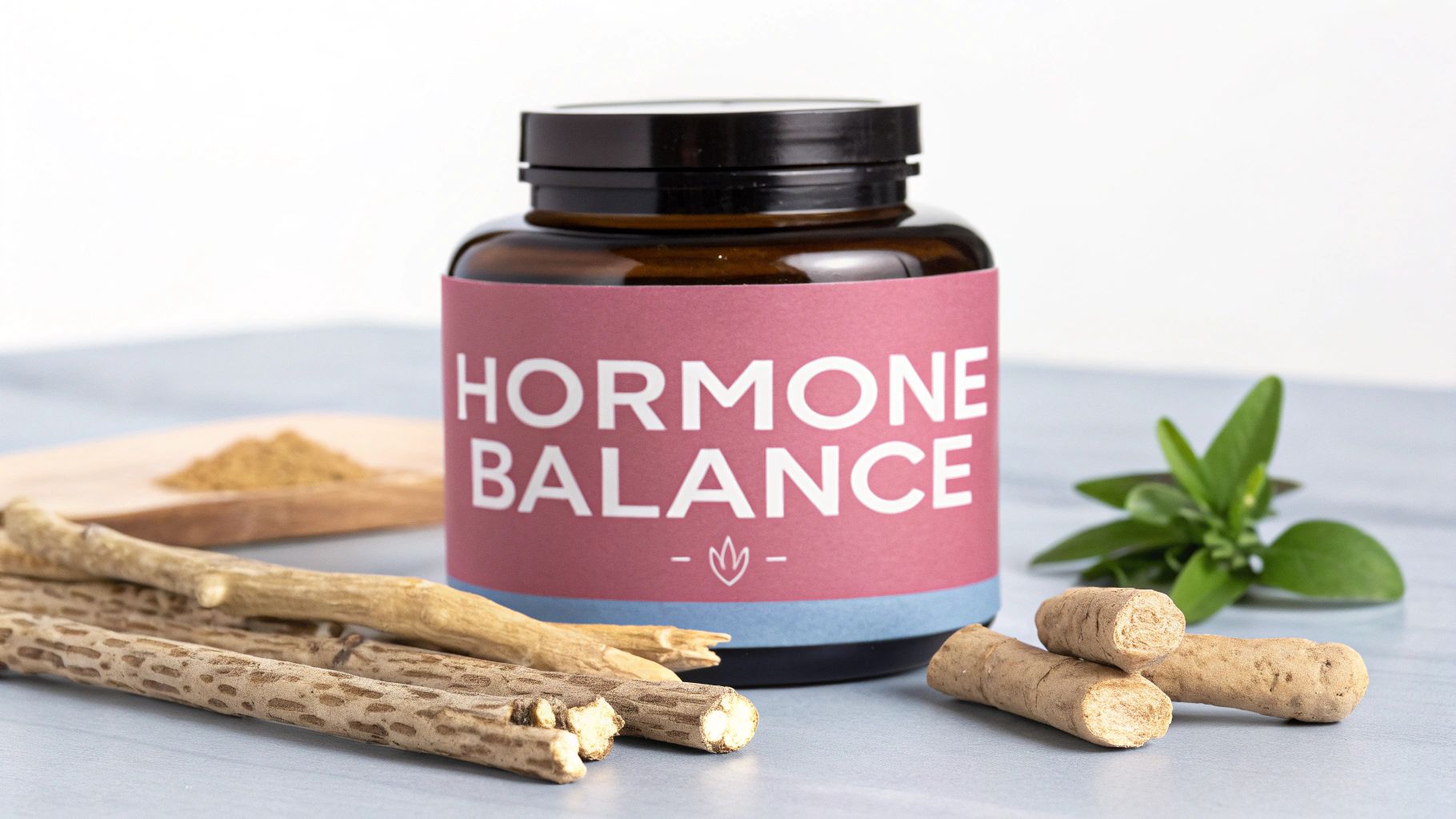
Its main mechanism involves lowering levels of cortisol, the body's primary stress hormone. Chronically high cortisol can suppress testosterone production, creating a hormonal imbalance. By mitigating this stress response, ashwagandha creates a more favourable environment for healthy testosterone synthesis. Research has also indicated it may directly support testicular function, with studies showing it can increase testosterone levels by 10-22% while also improving strength and muscle mass. Learn more about the herb's powerful stress-reducing properties and how it benefits overall well-being.
How to Use Ashwagandha Effectively
Ashwagandha's dual-action benefits of stress reduction and hormone support make it particularly versatile. Its calming properties are as valuable as its testosterone-boosting potential, appealing to a wide range of individuals looking to enhance both mental and physical performance.
For example, a stressed executive might use ashwagandha to help balance the pressures of a demanding job, which in turn supports healthier hormone levels. Similarly, gym-goers often incorporate it into their regimen alongside resistance training to amplify gains in strength and muscle mass. Men experiencing age-related drops in vitality also find it to be a valuable part of a comprehensive protocol for hormonal health.
The key to its success lies in consistent, long-term use, allowing its adaptogenic properties to fully take effect and rebalance the body's systems.
Actionable Tips for Supplementation
To get the most out of ashwagandha, consider these practical tips for effective supplementation:
- Choose a Standardised Extract: Look for high-quality, patented extracts like KSM-66 or Sensoril. These are standardised to contain a specific concentration of withanolides, the active compounds, ensuring potency and reliability.
- Optimal Dosage and Timing: Take 300–600 mg daily. To minimise the chance of stomach upset, it is best taken with meals.
- Be Patient and Consistent: The benefits of ashwagandha are cumulative. Allow at least 8-12 weeks of consistent daily use to experience its full effects on stress, vitality, and testosterone.
- Consider Evening Use: Some individuals find that ashwagandha has a calming or even slightly drowsy effect. If this is the case for you, taking your dose in the evening can aid relaxation and improve sleep quality.
3. Vitamin D3 (Cholecalciferol)
Vitamin D3, often called the "sunshine vitamin," is a fat-soluble vitamin that functions more like a steroid hormone within the body. While renowned for its role in bone health, its influence extends deep into the endocrine system, making it a critical component of the best testosterone boosting supplements. Its chemical structure is remarkably similar to testosterone, and it plays a direct role in optimising the enzymatic pathways required for testosterone synthesis within the Leydig cells of the testes.
The mechanism is twofold. First, Vitamin D3 helps to improve the sensitivity of androgen receptors, making the body more responsive to existing testosterone. Second, it may inhibit the process of aromatisation, where testosterone is converted into oestrogen, thereby helping to maintain higher free testosterone levels. Given that a significant portion of the population, particularly in regions with limited sunlight like the UK, is deficient in Vitamin D, supplementation is often a foundational step for hormonal support.
How to Use Vitamin D3 Effectively
The impact of Vitamin D3 is most pronounced in men who are deficient. Studies have shown that correcting a deficiency can increase total testosterone levels by 20–25%. This makes it an essential supplement for many individuals seeking to restore hormonal balance and improve overall vitality.
For instance, an office worker with minimal sun exposure might supplement with 3,000–4,000 IU daily to counteract the effects of an indoor lifestyle. Similarly, athletes living in northern climates often use Vitamin D3 during the autumn and winter months to maintain performance and hormonal health when natural sun exposure is scarce. It is also frequently recommended for men over 50, often combined with calcium and vitamin K2, to support both testosterone and bone density simultaneously.
Actionable Tips for Supplementation
To maximise the hormonal benefits of Vitamin D3, consider these practical recommendations:
- Test, Don't Guess: Before starting, get a blood test to determine your baseline Vitamin D levels. The goal is to reach and maintain an optimal range of 30–50 ng/mL (75–125 nmol/L).
- Take with Fat: As a fat-soluble vitamin, D3 absorption is significantly improved when taken with a meal containing healthy fats like avocado, nuts, or olive oil.
- Consider a K2 Partnership: Supplementing with Vitamin K2 alongside D3 helps ensure that calcium is directed to your bones and not deposited in arteries, optimising the overall health benefits of your D3 regimen.
4. Zinc (as Zinc Picolinate or Bisglycinate)
Zinc is an essential mineral that acts as a vital building block for male hormonal health. It is a cofactor in over 300 different enzymatic reactions within the body, including the crucial processes that synthesise testosterone. Because the body cannot store zinc, a consistent daily intake is necessary, and a deficiency is directly correlated with a significant drop in testosterone levels, making it a foundational component of many of the best testosterone boosting supplements.
Its mechanism of action is twofold. First, it plays a direct role in the testicular Leydig cells where testosterone is produced. Secondly, emerging research suggests zinc may act as a natural aromatase inhibitor. This means it can help prevent the conversion of free testosterone into oestrogen, preserving higher levels of the active male hormone in the bloodstream and enhancing its effects.
How to Use Zinc Effectively
The power of zinc lies in its ability to correct deficiencies that directly suppress testosterone production. Studies have consistently shown that supplementing with zinc can effectively restore and normalise testosterone levels in men who are deficient. This is particularly relevant for certain populations who are at a higher risk of low zinc status.
For instance, athletes who engage in intense training often lose significant amounts of zinc through sweat, making a daily dose of 15-30mg a common strategy to maintain hormonal balance and support recovery. Likewise, individuals on vegetarian or vegan diets may struggle to get enough zinc and can benefit greatly from chelated forms. Older men often use zinc as part of a classic "ZMA" stack alongside magnesium and vitamin B6 before bed to improve sleep quality and support hormone production.
Actionable Tips for Supplementation
To ensure you get the most out of your zinc supplement, consider these practical tips:
- Optimal Dosage and Timing: Take 15-30mg of elemental zinc daily. It is best taken with a meal to prevent the potential for nausea, a common side effect when taken on an empty stomach.
- Choose Chelated Forms: Opt for highly bioavailable forms like zinc picolinate or zinc bisglycinate. These chelated versions are bound to amino acids, making them much easier for the body to absorb and utilise compared to standard zinc oxide or sulphate.
- Maintain Mineral Balance: For long-term use, it's wise to balance your intake with copper. A good rule of thumb is to take approximately 2mg of copper for every 15mg of zinc to prevent imbalances. You can learn more about the importance of balancing trace minerals.
- Avoid Nutrient Interactions: Take your zinc supplement separately from calcium and iron supplements, as these minerals can compete for absorption in the gut, reducing the effectiveness of each.
5. Tongkat Ali (Eurycoma longifolia)
Tongkat Ali, also known as Malaysian Ginseng, is a flowering plant native to Southeast Asia with a long history of use in traditional medicine as an aphrodisiac and energy enhancer. Its scientific name is Eurycoma longifolia, and it has gained significant attention in the modern supplement industry, establishing itself as one of the best testosterone boosting supplements due to its unique mechanisms of action.
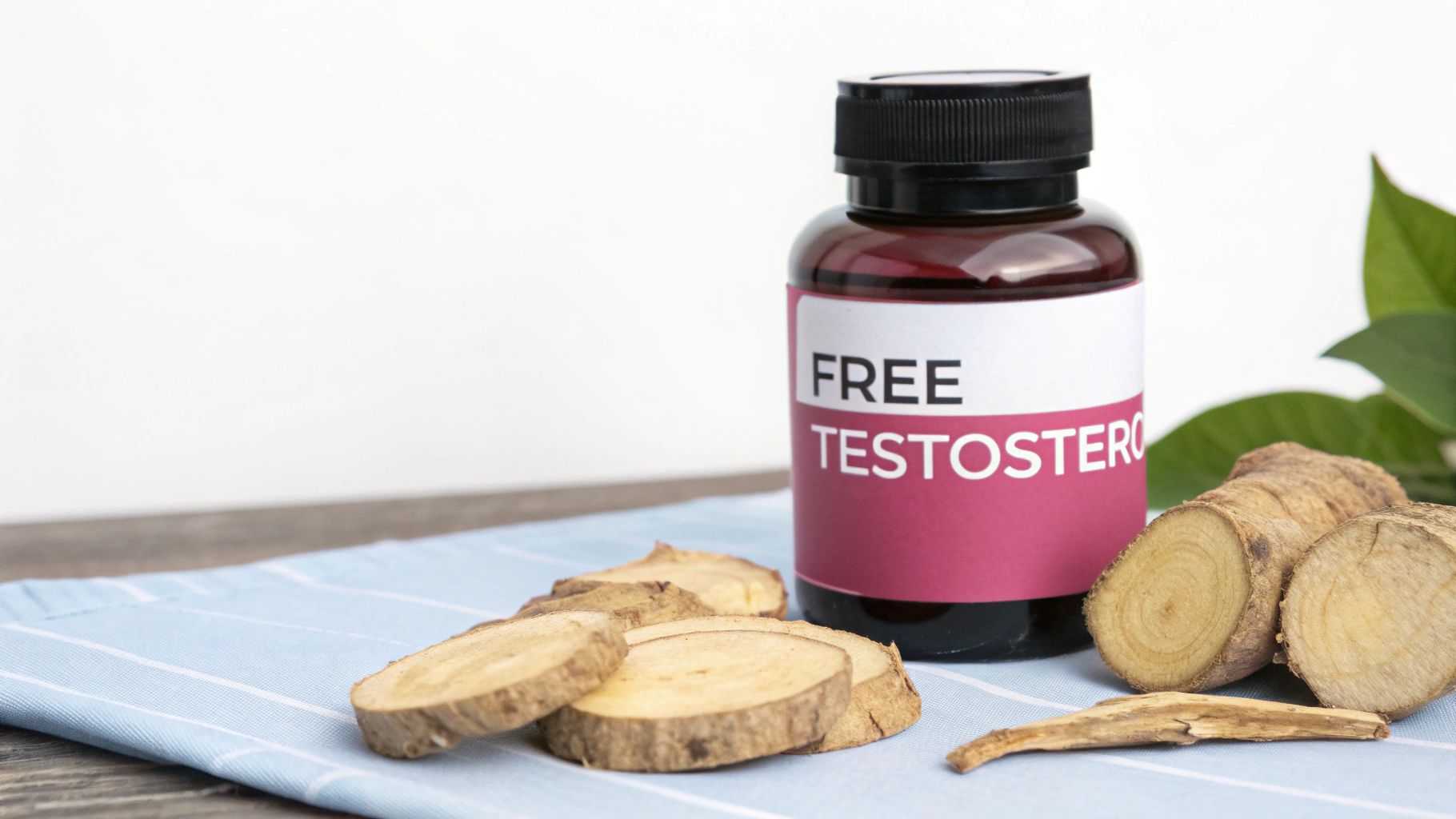
Unlike ingredients that directly stimulate hormone production, Tongkat Ali works primarily by influencing how testosterone is utilised in the body. It contains bioactive compounds called quassinoids, particularly eurycomanone, which help reduce levels of sex hormone-binding globulin (SHBG). SHBG binds to testosterone, rendering it inactive. By lowering SHBG, Tongkat Ali increases the amount of "free" testosterone available for your body to use, which is crucial for experiencing its benefits. It also supports the hypothalamic-pituitary-gonadal axis, promoting hormonal balance.
How to Use Tongkat Ali Effectively
The real power of Tongkat Ali lies in its ability to not only elevate total testosterone levels but also to improve libido, energy, and reduce stress by lowering cortisol. Studies have demonstrated testosterone increases of 20-37%, making it a reliable choice for men seeking comprehensive hormonal optimisation.
For example, a man experiencing low libido might take 400 mg daily for a 6 to 8-week period to restore drive and vitality. Athletes often integrate it into their pre-competition protocols to enhance performance and recovery. Furthermore, middle-aged men frequently combine Tongkat Ali with lifestyle changes like improved diet and exercise to effectively combat age-related hormonal decline. For those interested in natural performance enhancers, you can learn more about similar powerful adaptogens on myoji.co.uk.
Actionable Tips for Supplementation
To get the most out of supplementing with Tongkat Ali, follow these practical guidelines:
- Prioritise Standardised Extracts: Look for supplements with a standardised extract that clearly states the eurycomanone content. This ensures you are getting a potent and effective product.
- Start with a Lower Dose: Begin with 200 mg daily to assess your tolerance before potentially increasing the dose to 400 mg if needed.
- Time Your Dosage: For optimal absorption, take Tongkat Ali on an empty stomach, either first thing in the morning or between meals.
- Cycle Your Intake: To prevent building a tolerance and maintain its effectiveness, a common cycling strategy is to take it for five consecutive days followed by a two-day break.
6. Fenugreek (Trigonella foenum-graecum)
Fenugreek is a versatile herb with a history rooted in ancient Greek and Egyptian medicine, now recognised as one of the best testosterone boosting supplements. Native to the Mediterranean, this plant contains powerful compounds called furostanolic saponins. These substances are thought to be responsible for its hormone-regulating effects, making it a staple in modern wellness protocols.
The primary mechanism of Fenugreek is believed to involve the inhibition of enzymes like 5-alpha-reductase and aromatase. These enzymes convert testosterone into dihydrotestosterone (DHT) and oestrogen, respectively. By slowing this conversion process, Fenugreek helps maintain higher levels of free, bioavailable testosterone in the bloodstream, which can then be used by the body to support various functions from muscle growth to libido.
How to Use Fenugreek Effectively
Fenugreek's strength lies in its dual-action benefits, simultaneously supporting hormonal balance and offering metabolic advantages. Studies have shown that when combined with resistance training, it can increase free testosterone levels by up to 20%, while also improving strength, body composition, and sexual health.
For instance, powerlifters often integrate a 500mg daily dose into their strength-building phases to help maximise their training adaptations and support recovery. Men managing metabolic concerns may find its blood sugar-stabilising effects particularly beneficial, while some couples use it to enhance libido and intimacy, leveraging its long-standing reputation as an aphrodisiac.
These practical applications demonstrate why Fenugreek has earned its place as a reliable component in a comprehensive health and fitness strategy. Its ability to support testosterone levels while offering wider health benefits makes it a smart choice for many.
Actionable Tips for Supplementation
To get the most out of Fenugreek supplementation, consider these practical tips:
- Look for Standardised Extracts: Choose a supplement standardised to contain at least 50% furostanolic saponins to ensure you are getting a potent and effective product.
- Optimal Dosage and Timing: Take 500-600mg daily. Consuming it with a meal can aid absorption and minimise any potential gastrointestinal discomfort.
- Combine with Resistance Training: To unlock its full potential for improving strength and body composition, consistently pair Fenugreek supplementation with a structured resistance training programme.
- Monitor Blood Sugar: If you are diabetic or pre-diabetic, be mindful that Fenugreek can affect blood sugar levels. It's wise to monitor your levels closely and consult with your healthcare provider.
7. Magnesium (as Magnesium Glycinate or Citrate)
Magnesium is an essential dietary mineral that participates in over 600 biochemical reactions in the human body, many of which are crucial for optimal metabolic and hormonal health. Its role extends to energy creation, muscle function, and nervous system regulation. When it comes to hormonal balance, magnesium is a key player, directly influencing both total and free testosterone levels, making it a fundamental component of many of the best testosterone boosting supplements.
The mineral works through several mechanisms to support healthy testosterone. Firstly, it helps reduce the activity of Sex Hormone-Binding Globulin (SHBG), a protein that binds to testosterone and renders it inactive. By limiting SHBG's effect, more 'free' testosterone is available for the body to use. Additionally, magnesium is known to reduce inflammation and lower cortisol levels, the body's primary stress hormone, which can otherwise suppress testosterone production.
How to Use Magnesium Effectively
Magnesium's benefits are most pronounced in individuals who are deficient or have an active lifestyle. Research has demonstrated that supplementation can significantly increase testosterone, especially when combined with regular exercise. It is not a rapid-acting booster but rather a foundational mineral that creates an optimal internal environment for hormone production.
For example, athletes and fitness enthusiasts often supplement with 400 mg before bed to enhance recovery, improve sleep quality, and support anabolic processes overnight. Similarly, a stressed professional might combine magnesium intake with mindfulness practices to help manage cortisol levels, indirectly supporting healthier testosterone and improving overall resilience to stress.
Actionable Tips for Supplementation
To get the most out of magnesium supplementation for hormone support, follow these practical guidelines:
- Choose High-Bioavailability Forms: Opt for chelated forms like magnesium glycinate or citrate. These are absorbed more efficiently and are less likely to cause digestive upset compared to cheaper forms like magnesium oxide.
- Optimal Dosage and Timing: A daily dose of 200–400 mg is effective for most adults. Taking it in the evening can promote relaxation and improve sleep quality, which is vital for testosterone synthesis.
- Start Low and Go Slow: If you are new to magnesium supplements, begin with a lower dose (e.g., 100-150 mg) to assess your digestive tolerance before increasing to the full recommended amount.
- Timing with Other Minerals: To prevent absorption competition, take your magnesium supplement at least two hours apart from any high-dose calcium supplements.
Top 7 Testosterone Boosters Comparison
| Item | Implementation Complexity 🔄 | Resource Requirements ⚡ | Expected Outcomes 📊 | Ideal Use Cases 💡 | Key Advantages ⭐ |
|---|---|---|---|---|---|
| D-Aspartic Acid (DAA) | Moderate; short cycles recommended | Low; 3g daily powder or capsules | Rapid testosterone boost (30-60% in 6-12 days) | Men with low testosterone; athletes in cutting or recovery phases | Fast-acting, clinically proven, affordable |
| Ashwagandha (Withania somnifera) | Low; consistent daily use for 8-12 weeks | Moderate; standardized extracts 300-600mg daily | Moderate testosterone increase (10-22%) plus stress reduction | Stress management; age-related decline; strength training | Reduces cortisol, improves sleep, well-studied |
| Vitamin D3 (Cholecalciferol) | Low; daily supplementation, requires blood testing | Low; 2,000-4,000 IU daily | Moderate increase in deficient men (20-25%) | Men with vitamin D deficiency; limited sun exposure | Broad health benefits, inexpensive |
| Zinc (as Zinc Picolinate or Bisglycinate) | Low; daily intake with food | Low; 15-30mg daily, chelated forms recommended | Restores testosterone if deficient, supports immunity | Deficiency correction; active individuals; immune support | Natural aromatase inhibitor, widely available |
| Tongkat Ali (Eurycoma longifolia) | Moderate; cycling recommended (5 days on/2 off) | Moderate-High; 200-400mg daily extracts | Increases free testosterone (20-37%) + libido/energy boost | Libido improvement; hormone optimization; athletes | Boosts free testosterone, energy-enhancing |
| Fenugreek (Trigonella foenum-graecum) | Low; daily dosing with resistance training | Low; 500mg daily standardized extract | Moderate free testosterone increase (12-20%) + strength benefits | Strength phases; metabolic syndrome; libido enhancement | Improves strength, libido; blood sugar benefits |
| Magnesium (as Magnesium Glycinate or Citrate) | Low; daily use, preferably evenings | Low; 200-400mg daily, chelated forms | Increases free and total testosterone in deficient/active men | Sleep and recovery support; stress management; mineral deficiency | Supports sleep, reduces inflammation, inexpensive |
Building Your Personalised Hormone Support Strategy
Navigating the world of the best testosterone boosting supplements can feel overwhelming, but as we've explored, a structured approach makes all the difference. The journey to optimised hormonal health isn't about chasing a single "magic bullet" ingredient. Instead, it’s about crafting an intelligent, personalised strategy that addresses your unique physiological needs and lifestyle factors. The power lies in understanding how these individual compounds can work together synergistically.
We’ve delved into seven of the most well-researched ingredients, from the amino acid D-Aspartic Acid, which can help normalise low T-levels, to the adaptogenic powerhouse Ashwagandha, renowned for its ability to combat the testosterone-suppressing effects of chronic stress. Each component offers a distinct mechanism of action, highlighting that there is no one-size-fits-all solution.
Your Actionable Next Steps
The most effective path forward begins with a solid foundation. Before considering more specialised botanicals, assess your core nutritional status.
- Step 1: Address Foundational Deficiencies. Are you getting enough Vitamin D3, Zinc, and Magnesium? Given their crucial roles in the testosterone production cascade, rectifying any shortfalls in these three micronutrients is the most critical first step. This alone can yield significant improvements in energy, mood, and recovery.
- Step 2: Identify Your Primary Goal. Are you looking to directly stimulate testosterone production, or is your main challenge managing stress and improving sleep? If stress is a key factor, Ashwagandha is an excellent starting point. If you want to enhance free testosterone by managing SHBG, ingredients like Tongkat Ali or Fenugreek might be more appropriate.
- Step 3: Consider Synergistic Stacking. Think about how these supplements can complement each other. For example, a common and effective stack combines Zinc and Magnesium before bed to support sleep quality and recovery, which are fundamental for optimal hormone production. Layering Ashwagandha on top of this can further enhance stress resilience, creating a powerful trifecta for hormonal balance.
The Bigger Picture: Long-Term Vitality
Mastering this strategic approach moves you from a passive consumer to an informed architect of your own well-being. By understanding the "why" behind each supplement, you can make smarter choices, avoid wasting money on ineffective products, and build a regimen that truly supports your long-term goals. This personalised strategy empowers you to enhance not just a single hormone, but your overall vitality, mental clarity, physical performance, and resilience. Always remember to consult with a healthcare professional before beginning any new supplement protocol to ensure it is safe and appropriate for your individual health circumstances.
Ready to build a strong foundation for your hormonal health with a supplement that embraces this synergistic principle? Oji Shilajit Gummies offer a rich source of fulvic acid and over 84 trace minerals, providing comprehensive nutritional support that complements the targeted action of the individual ingredients we've discussed. Explore how you can enhance your vitality at Oji Shilajit.

